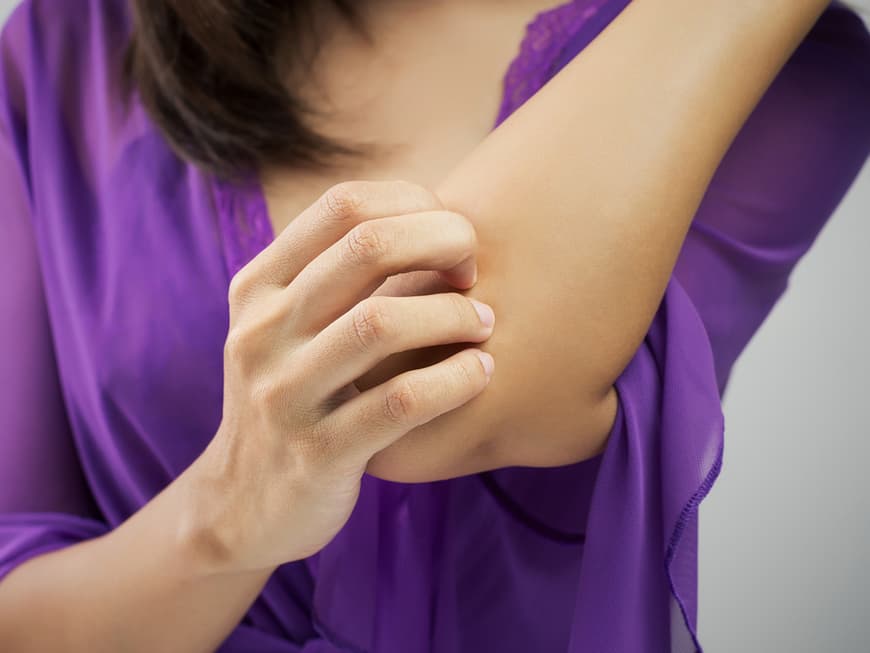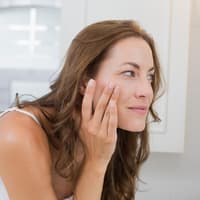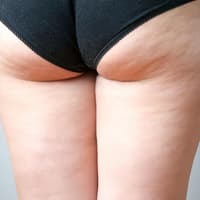
As temperatures rise, we can show more skin again. For people who suffer from the chronic skin disease psoriasis, however, the pleasure is often dampened. They are embarrassed by the silvery patches of skin. Even though the autoimmune disease psoriasis, as it is medically known, is not contagious, others often react with irritation. But sufferers do not have to do without T-shirts and shorts. There are good ways to make the consequences of the skin condition less visible.
What is psoriasis?
The name comes from the Greek: "psao" means "I scratch". Psoriasis is the medical term for psoriasis. Scratching is a side effect of the disease. The German name Schuppenflechte (psoriasis) refers to the appearance: silvery scales and inflamed, reddened skin.
The skin of a healthy person renews itself within 26 to 28 days. In patients with psoriasis, this period is reduced to one week. As a result, the new skin cells form shiny scales on limited areas of the skin, and the skin on these areas is very red and has a strong blood supply. This form - known as psoriasis vulgaris - affects around 97 percent of patients.
Symptoms of psoriasis
Psoriasis can also occur on the nails, the palms of the hands and under the soles of the feet. Sometimes the disease manifests itself as purulent pustules, sometimes it is just pin-sized spots all over the body. The diagnosis should always be made by a dermatologist. Because not everything that scales is automatically psoriasis. Sometimes psoriasis is mistaken for a fungal disease. In around 20 percent of patients, the joints also become affected, which is known as psoriatic arthritis. The joints hurt and movement is restricted as a result. Diagnosis is particularly difficult here if the skin is not also affected.
Blame for new flare-ups: certain neurotransmitters
"The flare-ups are triggered by activities in the brain that lead to an increase in neurotransmitters in the emotional areas of the brain. They reach the skin via the bloodstream or directly via nerve fibers. These messenger substances additionally stimulate the already overactive immune system and cause skin inflammation to intensify or even develop in the first place," explains psychodermatologist Prof. Dr. Uwe Gieler from the University of Giessen.
What helps against psoriasis?
With the right therapy, the symptoms can be significantly improved, sometimes even completely suppressed. In order to arm themselves against new flare-ups, patients should train themselves to deal with stress. In addition to progressive muscle relaxation, good results have been achieved with mindfulness meditation, as a US study has shown. Patients develop a more precise understanding of their body and how they perceive movements without judging them. After around 30 to 40 days, the skin condition of the study participants had improved. If the level of suffering is high, behavioral therapy can be used to learn how to better deal with feelings of shame and change personal attitudes. "If you manage to regulate yourself better by solving emotional problems, the skin changes become less pronounced," confirms Prof. Gieler.
Psoriasis is not contagious, nor is it a new phenomenon of civilization - there are references to patients with this skin disease as far back as the Old Testament. It is genetic and incurable - but the symptoms can be treated very well.
Taking proper care of the skin on a daily basis
For mild forms of psoriasis, ointments and creams containing active ingredients are usually used. For moderate to severe cases, tablets and injections are often prescribed in addition to UV light therapy or brine baths. If this does not bring any improvement either, highly effective biologics, for example with the active ingredient secukinumab, can help. Berlin dermatologist Prof. Dr. Wiebke Ludwig-Peitsch advises: "Psoriasis patients should use a moisturizing skin care product every day - even if the psoriasis is already well under control. This can help prevent relapses." Important: apply cream to the whole body, not just the affected area. "The creams can also contain mild anti-dandruff ingredients, i.e. keratolytics. Urea, also known as urea, in a concentration of three to ten percent is very effective," says the dermatologist.
Extra treatment for irritated scalps
The scalp is also often affected. "Psoriatics should use so-called keratolytic shampoos for hair care. They contain dandruff-dissolving active ingredients such as guanidine glycolate or anti-inflammatory agents such as bisabolol." It is best to discuss the choice with your dermatologist. "And if you have an irritated scalp, don't use fine combs - coarse brushes are better," advises the expert.
You may also be interested in this:






